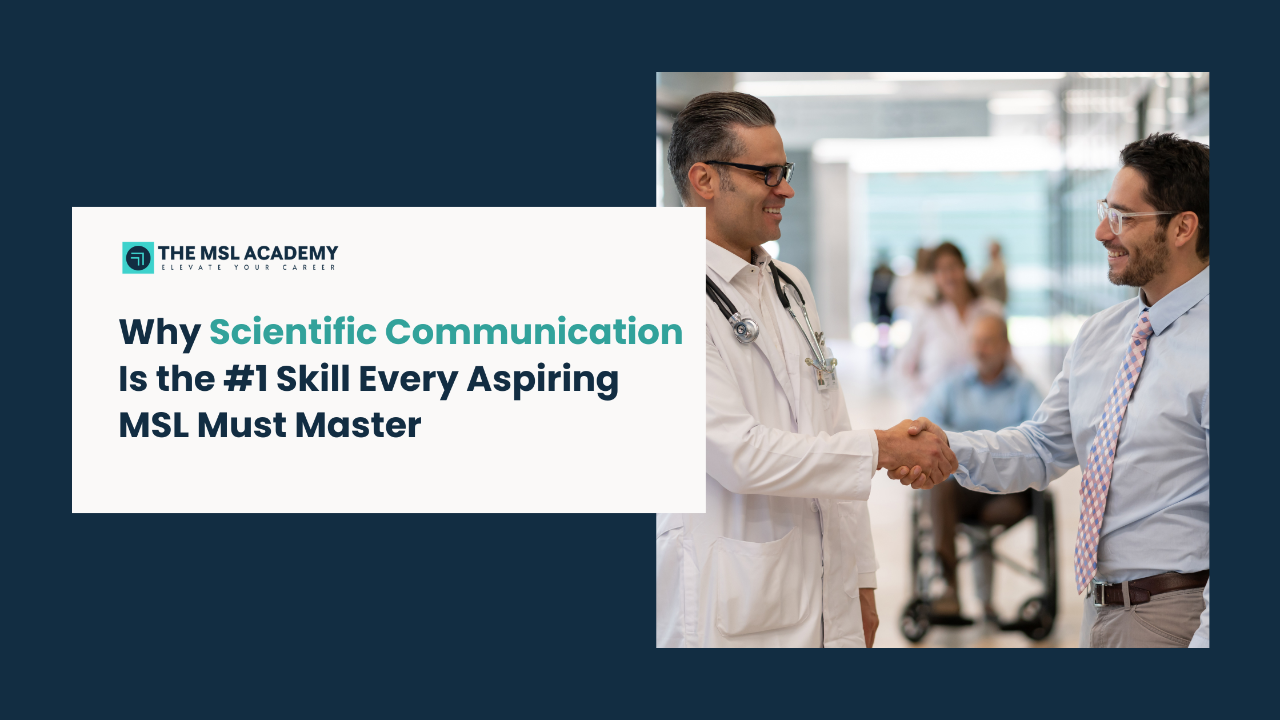Why Scientific Communication Is the #1 Skill Every Aspiring MSL Must Master
Aug 15, 2025
If you are an aspiring Medical Science Liaison (MSL), you have probably been told that you need strong communication skills. But, what does that really mean? Is it about being charismatic? Polished? Confident on Zoom?
Not exactly.

The single most important skill for success as an MSL is scientific communication. This is not just about being able to speak well. It is about translating complex clinical data into actionable insights for healthcare providers, engaging in meaningful two-way conversations, and becoming a trusted scientific peer in your therapeutic area.
In this article, we will break down what scientific communication really looks like in an MSL role, why it matters more than your degrees or credentials, and how you can start mastering this skill today.
What Is Scientific Communication in the MSL Role?
Scientific communication is the ability to understand, synthesize, and deliver complex medical and clinical information in a way that is accurate, compliant, and tailored to your audience. It is not just about presenting data. It is about engaging in dialogue and creating value in every interaction.
As an MSL, you may communicate in various formats, such as:
- In-person or virtual meetings with Key Opinion Leaders (KOLs)
- Scientific slide deck presentations
- Advisory board sessions
- Congress or conference booth discussions
- Clinical trial education and updates
- Responding to unsolicited medical information requests
- Internal meetings with cross-functional teams
Every touchpoint is an opportunity to demonstrate your credibility, clarity, and value.
Why Scientific Communication Matters More Than You Think
You might assume that your PhD, PharmD, MD, or clinical background is enough to prove your expertise. But in the MSL world, your ability to communicate that expertise is what sets you apart.
Here is why it matters:
1. It Builds Trust with KOLs
KOLs are often busy specialists who do not have time for vague or overly technical explanations. They want to speak with someone who understands the data and can discuss it peer-to-peer. Clear, concise communication builds rapport, trust, and long-term engagement.
2. It Demonstrates Peer Status
MSLs are not sales reps. They are scientific counterparts. When you speak clearly about data, demonstrate awareness of the literature, and ask thoughtful questions, you reinforce your position as a credible, respected medical colleague.
3. It Aligns with Compliance Expectations
In the highly regulated world of pharma, every word matters. Scientific communication helps ensure your conversations remain non-promotional, compliant, and focused on education, not persuasion.
4. It Differentiates You in Interviews
During the MSL interview process, you will be asked to present clinical data, interpret literature, and engage in scenario-based communication exercises. If you can deliver your message with clarity and confidence, you are more likely to make it to the final round, and get the offer.
Common Mistakes Aspiring MSLs Make with Scientific Communication

Even candidates with strong academic or clinical backgrounds often make mistakes when transitioning into industry. Here are a few to avoid:
Mistake #1: Speaking Like an Academic
Long, jargon-heavy explanations that worked in a research lab or at a medical conference can fall flat in an MSL conversation. KOLs and hiring managers want clarity, not complexity.
Fix it: Practice summarizing data in 2–3 sentences. Get to the point without watering down the science.
Mistake #2: Memorizing Instead of Understanding
Reciting a slide deck word-for-word does not demonstrate true expertise. MSLs must be able to explain the why behind the data, not just repeat statistics.
Fix it: Learn to interpret study design, endpoints, and clinical implications. Focus on what the data means for patient care.
Mistake #3: Talking Too Much
The best MSLs know when to stop talking and start listening. Communication is a two-way street. Insight gathering is just as important as data delivery.
Fix it: Ask open-ended questions. Create space for KOLs to share their perspectives and challenges.
Key Elements of Strong MSL Scientific Communication
Let’s break down the core components of effective scientific communication as it applies to the MSL role.

1. Clarity
Can you explain clinical endpoints, MOAs, or adverse event profiles clearly and concisely? Avoid overcomplicating the message. Make it digestible without being condescending.
2. Structure
Strong communicators organize their thoughts logically. Use frameworks like:
- Problem → Data → Impact
- Study Design → Results → Clinical Relevance
- “So What?” method: why does this data matter for this audience?
3. Adaptability
You will speak differently to a cardiologist than to an internal stakeholder on the commercial team. Tailor your tone, level of detail, and messaging based on your audience.
4. Active Listening
An overlooked but essential skill. Great scientific communication is not one-sided. Be fully present. Listen for signals, gaps, or needs that you can follow up on.
5. Engagement
Can you hold someone’s attention in a 10-minute congress booth conversation? The best MSLs use stories, analogies, or real-world data to bring the science to life.
How to Start Practicing Scientific Communication Today
You do not need to wait for an MSL job offer to start sharpening this skill. Here are ways to start improving right now:
1. Practice Presenting Clinical Papers
Choose one pivotal trial in your therapeutic area and create a 5-minute summary. Present it aloud or record yourself. Focus on:
- Study objective
- Design and patient population
- Key findings
- Safety data
- Clinical implications
Ask a peer or mentor to give you feedback.
2. Start Posting on LinkedIn
Share takeaways from new journal articles or congress presentations. This improves your ability to synthesize data and boosts your visibility in the medical affairs community.
3. Join Journal Clubs or Case Discussions
If you are still in academia or clinical practice, volunteer to lead a discussion. Practice facilitating dialogue and making data clinically relevant.
4. Work with a Coach
At The MSL Academy, our coaches work with aspiring MSLs to sharpen their scientific storytelling and build real-time communication confidence.
What Hiring Managers Say About Scientific Communication
Here are real quotes from MSL hiring managers across biotech and pharma:
“We can teach the science. What we cannot teach is how to carry yourself in front of a KOL.”
“If a candidate cannot walk me through a clinical study without looking at notes, they are not ready for the field.”
“I want to hear how they think. Can they interpret data, connect it to the real world, and have a conversation, not a lecture?”
These comments reinforce that technical skill alone is not enough. Your ability to communicate science effectively is what will earn you the role.
You Do Not Need to Be a Natural Speaker, You Just Need Practice
Many aspiring MSLs feel nervous about public speaking, especially when it involves high-stakes data or expert audiences. But the truth is, scientific communication is a skill you can build, not a talent you must be born with.
In our coaching calls at The MSL Academy, we have seen:
- Clinicians with no prior presentation experience transform into confident scientific speakers
- Introverted researchers learn to facilitate engaging discussions with specialists
- International candidates overcome language barriers to succeed in U.S.-based roles
Final Takeaways
If you are serious about becoming an MSL, scientific communication should be your top development priority. It is the foundation of everything you will do in the role, from engaging KOLs to supporting clinical trials to presenting at advisory boards.
Here is what to remember:
- MSL communication is not about sounding impressive. It is about being clear, credible, and collaborative.
- Practice matters more than polish. Start improving today with micro-presentations, feedback loops, and real-world examples.
- Communication is how you demonstrate your readiness to enter the MSL world, especially if you do not have industry experience.
Want to Build Scientific Communication Skills That Set You Apart?
The Excel Into MSL™ Platinum Program was built to help aspiring MSLs like you learn how to present data, communicate with confidence, and become the candidate hiring managers cannot ignore.
You will work one-on-one with MSLs and former hiring managers, get customized feedback, and practice in real-world scenarios until you are ready for any interview or KOL engagement.
If you have not watched our free masterclass for aspiring MSLs, watch it here.
Join the many professionals who have landed their first MSL roles through our proven process.



